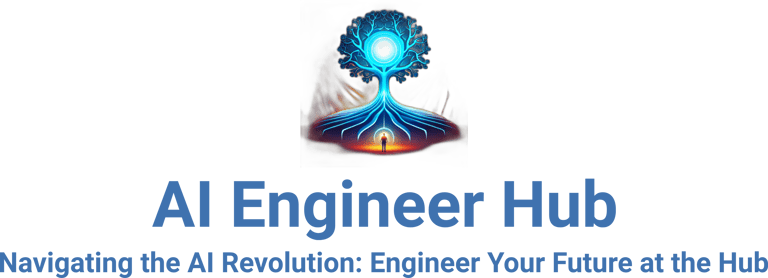
“The Listening Dark” - Now Available on Spotify!
ChatGPT and the Dawn of Computerized Hyper-Intelligence
Explore the intricate world of AI in a conversation between Dr. Jordan Peterson and AI researcher Brian Roemmele. Dive into the potential and limitations of AI models like ChatGPT, the importance of AI ethics, and the future of personalized AI. Discover how we can maximize the benefits of AI through effective interactions and open-mindedness.
CHATGPTARTIFICIALINTELLIGENCEJORDANPETERSONAIETHICSPERSONALIZEDAIAIUNDERSTANDINGAIINTERACTIONSBRIANROEMMELE
Dr. Jordan B. Peterson, Brian Roemmele
6/27/20233 min read
ChatGPT and the Dawn of Computerized Hyper-Intelligence
Explore the intricate world of AI in a conversation between Dr. Jordan Peterson and AI researcher Brian Roemmele. Dive into the potential and limitations of AI models like ChatGPT, the importance of AI ethics, and the future of personalized AI. Discover how we can maximize the benefits of AI through effective interactions and open-mindedness.
Understanding AI Models Like ChatGPT
In this conversation with AI researcher Brian Roemmele, Dr. Jordan Peterson discusses large language models such as ChatGPT, their potential, and the limitations they possess. Roemmele explains that these AI models are based on statistical algorithms and are trained to analyze vast amounts of data, including text and languages. They discuss the idea that AI models can "hallucinate" and produce false information, which may be seen as a flaw, but also as a creative process akin to human thought.
The Role and Functioning of AI Models
The speakers note that AI models like ChatGPT function as if they are super intelligent children trying to please, and can be subject to guidelines and adapt their behavior accordingly. They acknowledge the limitations of understanding AI, given the complex hidden layers of these models that even AI scientists find challenging to fully comprehend.
Exploring the Interdisciplinary Nature of AI
Roemmele emphasizes the need to explore AI from an interdisciplinary standpoint, incorporating perspectives from psychology, philosophy, and literature to complement the technological aspects. The conversation delves into the difference between human understanding and AI understanding, with Dr. Peterson suggesting that AI systems would need to translate words into images and then into embodied behavior to gain understanding.
The Potential of Personalized AI
Roemmele emphasizes the importance of personalized AI, suggesting AI could serve as an "intelligence amplifier" by encoding and processing an individual's life experiences. This idea is akin to a science fiction concept called the Diamond Book, which encompasses a person's entire lifetime of knowledge and memories. The speakers also discuss the potential for creative insights from AI systems built from renowned figures' works like Carl Jung or Joseph Campbell.
The Future of AI Systems
Dr. Peterson and Roemmele discuss potential future developments with AI systems, such as combining large language models with image processing capabilities to create more accurate and factual outputs that are calibrated against real-world data. They also explore the concept of an AI "gadget" – a local and personalized AI system that can cater to individual needs and ensure privacy.
Ethical Implications and Challenges
The conversation shifts toward the potential downsides related to privacy invasion and the escalating power struggle between personalized AI and government or corporate AI systems. They ponder the implications of the growing interdependence between humans and technology, positing that humanity has already evolved into a form of androids with smartphones and other gadgets as extensions of the self.
Preserving Knowledge and History
The speakers touch on concerns regarding preserving knowledge and history, particularly in the digital age as records decay and the internet may not be eternal. Romley suggests holographic crystal memory as a means of storing data that can last up to 35,000 years.
Maximizing the Potential of AI Models
Roemmele hints at the possibility of an AI university to teach users how to effectively interact with advanced AI systems and improve creativity by embracing constraints. This would allow individuals to fully utilize the potential of AI models like ChatGPT by understanding and probing these models in creative ways.
Key Takeaways
AI systems can "hallucinate" false information but can also provide creativity and insights.
Studying the behavior and reactions of AI systems can generate valuable insights despite the complex hidden layers of these models.
AI can be used as an "intelligence amplifier" by encoding and processing individuals' life experiences, potentially fulfilling the concept of a Diamond Book.
The future of AI may involve a merging of large language models with image processing to create more accurate outputs.
Personalized AI systems that serve as a personal guide, memory enhancer, or even therapist raise ethical concerns about privacy and power struggles.
Curiosity, open-mindedness, and effective interaction strategies can help maximize AI's creative potential and insights.
The preservation of knowledge, history, and AI accessibility are critical to ensure its potential benefits are realized and shared by all.
In summary, Dr. Peterson and AI researcher Brian Roemmele discuss the potential and limitations of AI models like ChatGPT. They emphasize the need for effectively interacting with these AI systems to ensure their potential for creativity, insight, and knowledge discovery is maximized. They also raise concerns about preserving knowledge, personal privacy, and the importance of ethical oversight in AI development.
#ChatGPT #ArtificialIntelligence #BrianRomley #JordanPeterson #AIEthics #PersonalizedAI #AIUnderstanding #AIInteractions

